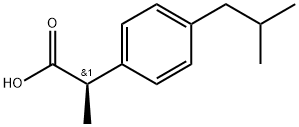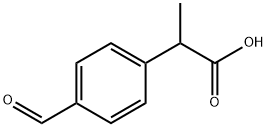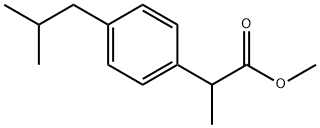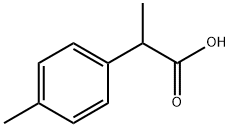(R)-(-)-IBUPROFEN
- CAS NO.:51146-57-7
- Empirical Formula: C13H18O2
- Molecular Weight: 206.29
- MDL number: MFCD00069290
- SAFETY DATA SHEET (SDS)
- Update Date: 2024-11-19 23:02:33

What is (R)-(-)-IBUPROFEN?
Description
Ibuprofen is a non-steroidal anti-inflammatory drug with diverse biochemical actions, most notably inhibiting COX-1 and COX-2 (IC50s = 2.6 and 1.53 μM, respectively). It is commonly synthesized as a racemic mixture of (S) and (R) isomers (Item No. item 70280). (R)-Ibuprofen is an enantiomer that is generally not considered a COX inhibitor and is instead thought to be involved in pathways of lipid metabolism as it is incorporated into triglycerides along with fatty acids. The (R) enantiomer can, however, inhibit NF-κB activation (IC50 = 121.8 μM) in response to T-cell stimulation as well as block superoxide formation, β-glucuronidase release, and LTB4 generation by stimulated neutrophils (IC50 values range from 40-100 μM). 50-60% of (R)-ibuprofen is inverted to (S)-ibuprofen in humans after oral administration.
Chemical properties
White Crystalline Solid
The Uses of (R)-(-)-IBUPROFEN
A nonsteroidal anti-inflammatory drug (NSAID); activity resides primarily in the (S)-isomer.
The Uses of (R)-(-)-IBUPROFEN
A nonsteroidal anti-inflammatory drug (NSAID); activity resides primarily in the (S)-isomer
Definition
ChEBI: Levibuprofen is an ibuprofen. It is an enantiomer of a dexibuprofen.
What are the applications of Application
(R)-Ibuprofen is an inhibitor of Cox-1 and Cox-2
Purification Methods
Crystallise the (+) and (-) acids from EtOH or aqueous EtOH. The racemate which crystallises from pet ether with m 75-77o is sparingly soluble in H2O and has IR (film) 1705 (C=O), 2300—3700 (OH broad)cm-1. It is used as a non-steroidal anti-inflammatory. [Shiori et al. J Org Chem 43 2936 1978, Kaiser et al. J Pharm Sci 65 269 1976, J Pharm Sci 81 221 1992, Freer Acta Cryst (C) 49 1378 1993 for the (S+)-enantiomer.]
Properties of (R)-(-)-IBUPROFEN
| Melting point: | 41-42°C |
| Boiling point: | 305.14°C (rough estimate) |
| Density | 1.0176 (rough estimate) |
| refractive index | 1.5290 (estimate) |
| storage temp. | Sealed in dry,2-8°C |
| solubility | Chloroform (Slightly), Ethanol (Slightly), Methanol (Slightly) |
| form | White crystalline powder. |
| pka | 4.41±0.10(Predicted) |
| color | Colourless to Pale Beige Oil |
| Water Solubility | 369.3mg/L(25 ºC) |
Safety information for (R)-(-)-IBUPROFEN
| Signal word | Warning |
| Pictogram(s) |
 Exclamation Mark Irritant GHS07 |
| GHS Hazard Statements |
H302:Acute toxicity,oral H315:Skin corrosion/irritation H319:Serious eye damage/eye irritation H335:Specific target organ toxicity, single exposure;Respiratory tract irritation |
| Precautionary Statement Codes |
P261:Avoid breathing dust/fume/gas/mist/vapours/spray. P305+P351+P338:IF IN EYES: Rinse cautiously with water for several minutes. Remove contact lenses, if present and easy to do. Continuerinsing. |
Computed Descriptors for (R)-(-)-IBUPROFEN
New Products
(S)-3-Aminobutanenitrile hydrochloride 4-Methylphenylacetic acid N-Boc-D-alaninol N-BOC-D/L-ALANINOL Tert-butyl bis(2-chloroethyl)carbamate 3-Morpholino-1-(4-nitrophenyl)-5,6-dihydropyridin- 2(1H)-one Furan-2,5-Dicarboxylic Acid Tropic acid 1-Bromo-3,5-Di-Tert-Butylbenzene S-2-CHLORO PROPIONIC ACID ETHYL ISOCYANOACETATE 2-Bromo-1,3-Bis(Dimethylamino)Trimethinium Hexafluorophosphate 4-IODO BENZOIC ACID 3-NITRO-2-METHYL ANILINE 1-(2,4-DICHLOROPHENYL) ETHANAMINE (2-Hydroxyphenyl)acetonitrile 4-Bromopyrazole 2-(Cyanocyclohexyl)acetic acid 4-methoxy-3,5-dinitropyridine 1-(4-(aminomethyl)benzyl)urea hydrochloride 2-aminopropyl benzoate hydrochloride diethyl 2-(2-((tertbutoxycarbonyl)amino) ethyl)malonate tert-butyl 4- (ureidomethyl)benzylcarbamate Ethyl-2-chloro((4-methoxyphenyl)hydrazono)acetateRelated products of tetrahydrofuran








You may like
-
 2033-24-1 98%View Details
2033-24-1 98%View Details
2033-24-1 -
 42831-50-5 5-METHYLISOXAZOLE-4-CARBOXYLIC ACID 98%View Details
42831-50-5 5-METHYLISOXAZOLE-4-CARBOXYLIC ACID 98%View Details
42831-50-5 -
 1975-50-4 98%View Details
1975-50-4 98%View Details
1975-50-4 -
 2-HYDROXY BENZYL ALCOHOL 98%View Details
2-HYDROXY BENZYL ALCOHOL 98%View Details
90-01-7 -
 2-Chloro-1,3-Bis(Dimethylamino)Trimethinium Hexafluorophosphate 221615-75-4 98%View Details
2-Chloro-1,3-Bis(Dimethylamino)Trimethinium Hexafluorophosphate 221615-75-4 98%View Details
221615-75-4 -
 61397-56-6 CIS BROMO BENZOATE 98%View Details
61397-56-6 CIS BROMO BENZOATE 98%View Details
61397-56-6 -
 14714-50-2 (2-Hydroxyphenyl)acetonitrile 98+View Details
14714-50-2 (2-Hydroxyphenyl)acetonitrile 98+View Details
14714-50-2 -
 118753-70-1 98+View Details
118753-70-1 98+View Details
118753-70-1